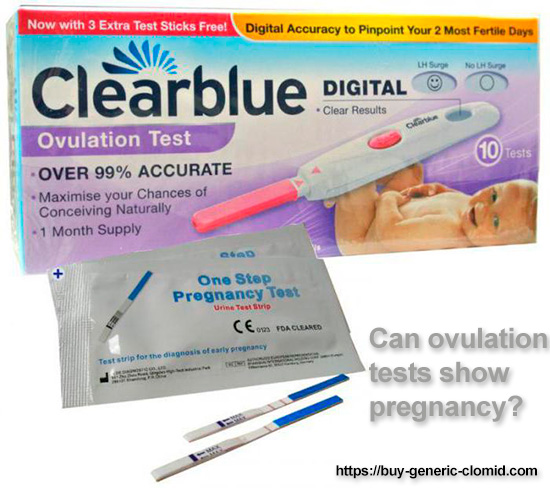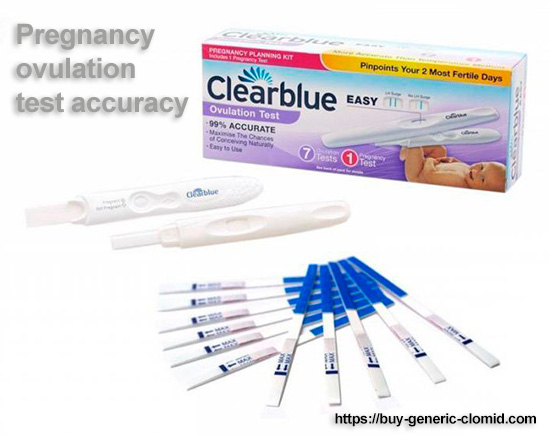A woman’s hormonal background changes over the course of a month, and it is influenced by a huge number of factors, including the day of the cycle, contraceptives, stress, and much more. Therefore, it is difficult to determine whether your hormonal background is in order without special tests. For rapid diagnostics, home tests were developed that allow you to determine ovulation and pregnancy. It seems simple, but women began to be interested in the question of whether ovulation tests can show pregnancy, or how it will behave if the egg is already fertilized.
What is ovulation?
This is a natural, monthly process by which a woman becomes capable of procreation. That is, it is directly the process of egg release. This is where conception should occur if a sperm is found on its way.

Women who are at peace with their body are able to feel the approach of ovulation. During this period, sexual desire increases, nature knows when to look for a partner, there may be a slight feeling of pain in the ovaries. All this indicates that the right moment is approaching. To track this favorable period, you can use special tests. But the question is, can ovulation tests show pregnancy? Let’s figure it out together.
How does the ovulation test work?
This is very important to determine the most favorable moment for conception. Many women who are unable to get pregnant for a long time acquire these tests in large numbers, every day tracking the approaching output of the egg. The principle of operation of this test is quite simple. The test strip determines the level of luteinizing hormone (LH) in the urine. Shortly before the follicle breaks, the level of this hormone reaches its maximum level. As soon as you see 2 strips on the test, it means that ovulation will occur in about 12-48 hours. However, don’t forget that any test can fail. Make sure that the brightness of the test strip does not differ from the control one, otherwise the result may be considered unreliable. However, if a woman is planning to conceive, she is always interested in whether ovulation tests can show pregnancy. Numerous examples show that this is possible. Let’s talk about this in more detail.
If a pregnant woman uses the ovulation test
First of all, we would like to draw your attention to the fact that home tests are much less reliable than laboratory tests performed by doctors in a hospital. That is why quite often litmus tests can give one for another, pregnancy for ovulation, and Vice versa. Both ovulation and pregnancy are determined by the level of the hormone in the urine. Despite the fact that the hormones are different, such simple tests can easily be mistaken for one another. The surge of the hormone during ovulation and during conception looks about the same for them. That is why it is possible to answer the question in the affirmative whether ovulation tests can show pregnancy, but the reliability of this method will always be in question.
Different tests: what we will measure
Theoretically, the ovulation test should only determine the maturation and yield of the next egg. It is clear that if you are pregnant, this is not possible, but there is a huge amount of evidence that the ovulation test shows pregnancy much sooner than a specialized litmus test.
Sometimes women confuse these two types of tests, sometimes the pharmacy mistakenly sells them the wrong thing they ask for. As a result, you can ask whether an ovulation test can show pregnancy , and get an affirmative answer. While pregnant, many girls received a positive ovulation test. Others for the sake of interest, already reliably knowing about their pregnancy, checked the result of the ovulation test, and it also often turns out to be positive.
False indicators
Before you say whether the ovulation test can show pregnancy, you should warn that this is in any case the result of an imperfect diagnostic system, which means that you can not trust such indicators. If you are pregnant, the test result, once positive, will not turn into a negative. If this happens, you should immediately tell your doctor.
In this case, the ovulation test can show pregnancy, but only because the chorionic gonadotropin and luteinizing hormone have similar formulas, and the test has not only high sensitivity,but also a fairly large error.
To summarize
If we talk about whether a pregnancy test after ovulation will show the desired two strips, then any doctor will say that it is unlikely, because it has much less sensitivity. For a reliable result, you must wait for the first day of the delay. For this reason, a pregnancy test is not used to determine the onset of ovulation, its sensitivity is clearly insufficient. They will not be able to detect a slight increase in lutein.
Sometimes, Clomid is used to stimulate pregnancy. However, this is not the case with the second test strip. Whether the ovulation test shows pregnancy, many years in a row are discussed on all forums. Yes, indeed, it does. Therefore, it is possible to use it for the diagnosis of conception, although it is not economically feasible. The cost of such a test is several times higher than the price of the most expensive pregnancy test.

After we have determined that it is possible to get an answer about your interesting position using an ovulation test, the question arises about the accuracy of this method. So it is logical to ask, does the ovulation test always show pregnancy? No, this method does not give 100% accuracy, because initially this litmus strip has other tasks. In order for you to determine the onset of ovulation, a test that is impregnated with reagents is used to detect the LH hormone in the urine. Its maximum concentration is in the urine during the period of egg release. If you get clear two stripes, it means that ovulation has already occurred and the optimal time for conception has arrived.
to determine an interesting position, you need to use another test, impregnated with reagents that react to the hormone HCG. From the first day of delay, you can get clear two stripes, which indicates that you are really pregnant. Thus, it is clear that these two tests respond to different hormones, and therefore, one will not replace the other. Ask any physiologist or doctor about whether ovulation occurs during pregnancy, and prepare for the fact that he will be very surprised. Of course not, the tasks of this mechanism have already been completed. The egg went into the fallopian tube, was fertilized, and implanted in the uterus. Until the birth of a new egg will not be formed.